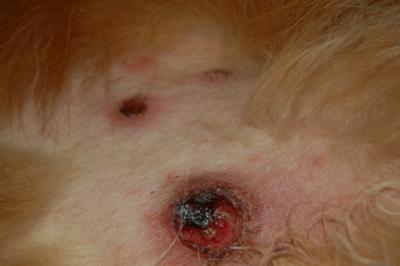by Denise Libby
(Coral Springs, FL)
Approx. two weeks ago little bumps appeared on her flank. They grew in diameter and then began appearing all over her body. The bump oozes (no pus) and scabs. Approx. 50 – 75 sites from head to toe.
Regular vet did needle aspiration of 4 sites with no real diagnosis (due to poor collection). Wanted to put her on antibiotics and do biopsy.
Holistic Vet put her on congeplex and dermal support as he is unsure what this is.
She is not itching, but seems uncomfortable. Wears blow up e collar to prevent licking.
Would like some direction as to what this is and how to care for it.
12 year old spayed female golden retriever. Raw food/home cooked diet only.
3 months ago had liver lobectomy due to benign hyperplastic nodule.
Comments for Skin Lumps/Lesions on Flank – Allergic Reaction or Unhealthy Skin? | ||
| ||
| ||
| ||
| ||
| ||
| ||
Click here to go back to the Ask a Vet Online Library of questions.
Do you believe in holistic pet care? If so, please tell your friends about us. Thank you for supporting our efforts!
Also see…
- Back to Dog Health Problems Symptoms / Dog Illness Signs Symptoms / Natural Dog Remedies
- Back to 10 Best Dog Food Options / Dog Food Ratings / Buy Dog Food Online
- Back to Conventional vs. Holistic Veterinarians
- Back to Organic Dog Supplies Online
- Back to Pet Friendly Airlines / Pet Friendly Travel
- Back to Organic Pet Digest Natural Dog Care Home Page



